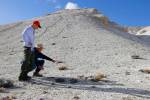Eastern Nevada pipeline opponents win court ruling
The well has run dry once again for the Southern Nevada Water Authority’s controversial pipeline project.
For the second time since 2009, a judge has stripped the authority of permission — at least temporarily — to siphon billions of gallons of groundwater a year from across eastern Nevada.
In a highly anticipated decision issued Tuesday but not yet on file with the Seventh District Court in Ely, Senior District Judge Robert Estes ruled that the state’s chief water regulator has more work to do before allowing the authority to sink its wells in four lonesome valleys in Lincoln and White Pine counties.
Specifically, Estes ordered the state engineer to recalculate and likely reduce how much the authority can safely be allowed to pump from Spring, Cave, Dry Lake and Delamar valleys to avoid draining the basins and causing conflicts with other water rights holders there and elsewhere.
Particularly in Spring Valley, where the most pumping is expected to occur, Estes found the amount of water granted to the authority would prevent the basin from reaching equilibrium even after 200 years. This so-called water mining “is unfair to following generations of Nevadans and is not in the public interest,” he said.
The judge also pointed to serious flaws and omissions in the state’s plan to monitor the impact of the project and curb any “unreasonable” damage it might cause. Estes said the state doesn’t even offer a clear definition of what an unreasonable impact might be.
He directed the state engineer to develop a specific monitoring program and identify clear triggers for what level of damage from large-scale groundwater pumping should prompt corrective action.
And any such mitigation plans should include “down-gradient” water users in Millard and Juab counties at the western edge of Utah, the judge said.
Simeon Herskovits, the lawyer for many of those who officially protested the authority’s pipeline, called the decision “a big victory for us.”
“The judge ruled in our favor on a host of the core deficits in this project that we’ve been talking about for years,” he said.
If the ruling survives an expected appeal to the Nevada Supreme Court, Herskovits said, it could fundamentally change the way regulators review the authority’s controversial pipeline. The state engineer won’t be allowed to essentially “rubber stamp” the project anymore, he said.
The state engineer’s office issued a brief statement Wednesday afternoon expressing disappointment with the ruling but declining further comment until the 23-page document can be studied in detail.
In their statement on the ruling, water authority officials said they were pleased with parts of the judge’s decision but plan to evaluate their legal options in the coming weeks.
“The court has asked the state engineer to gather additional data before rights are granted and water is developed, and SNWA is confident that this can be done,” the statement from the authority said.
Since the late 1980s, Las Vegas water officials have pushed plans to import groundwater from across eastern Nevada to supply future growth and provide a backup supply to the Las Vegas Valley, which gets 90 percent of its drinking water from an overtaxed and drought-stricken Colorado River.
Water authority officials hope to deliver water to the valley from as far north as Great Basin National Park through a network of pumps and pipelines stretching more than 300 miles and costing as much as $15 billion.
When — or perhaps if — the authority is cleared to build the pipeline, construction is expected to take 10 to 15 years, though water could begin flowing to Las Vegas from the southernmost basins in as little as five years.
The valley’s wholesale water supplier — and, ultimately, water ratepayers — have already spent tens of millions of dollars on permitting and prep work for the project.
The scheme has drawn fierce opposition from rural residents, ranchers, American Indian tribes, conservationists, outdoor enthusiasts and the Church of Jesus Christ of Latter-day Saints, which owns a cattle ranch in Spring Valley.
Rob Mrowka, Nevada spokesman for the environmental group Center for Biological Diversity, said the ruling is a victory for pipeline opponents and water authority customers alike.
“Dozens of species would have faced certain extinction had the groundwater mining project moved forward,” Mrowka said in a statement. “The existing water rights of communities and families would have also been impacted, and the residents of Las Vegas would have been buried under a $15.5 billion mortgage for a pipeline that isn’t needed.”
Estes’ decision came in response to an appeal pipeline opponents filed last year. They asked the court to review and overturn State Engineer Jason King’s March 22, 2012, order granting the authority permission to pump as much as 84,000 acre-feet of groundwater a year from the four valleys.
King’s decision came roughly two years after the state Supreme Court struck down two previous rulings that gave the authority almost 79,000 acre-feet a year from the same valleys.
One acre-foot of water can supply two average valley homes for one year. By reusing the water from the pipeline, the authority hopes to be able to supply more than 300,000 homes with the project.
In October 2009, a different district court judge struck down a previous state engineer’s ruling granting the authority water rights in the three Lincoln County watersheds.
The Supreme Court eventually ordered the state engineer to conduct new hearings on the four valleys, which King did in 2011.
Herskovits, who has been arguing against the pipeline project for years, acknowledged that opponents have a long way to go before their fight is done.
Authority officials have said they expect to be defending their project in court for years to come. This particular case was almost guaranteed to wind up in the Supreme Court no matter how Estes ruled on it, Herskovits said.
“I have always assumed that,” he said.
When the lawyer got the news Wednesday morning, he was hard at work on something else: a federal lawsuit against the U.S. Bureau of Land Management for granting a right-of-way for the authority to build its pipeline.
Contact reporter Henry Brean at hbrean@reviewjournal.com or 702-383-0350. Follow him on Twitter at @RefriedBrean.





























